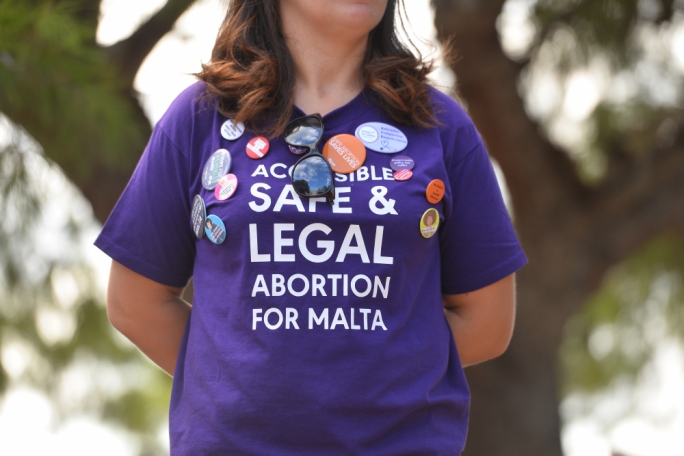28 September was International Safe Abortion Day, a day set by the World Health Organisation to ensure basic reproductive rights around the world. Despite the taboo surrounding the subject in Malta, grassroots activism over the past two years has frequently seen it fall under the spotlight of public debate.
Now that politicians cannot avoid the subject, those who make the headlines are using abortion as a political game with little regard to the actual changes that need to be introduced. Add to this the fact that the discourse on abortion brings out the prescience of Malta’s class divides, and that recent events continue to display the hostility towards abortion and women’s rights still entrenched within the legal system – and the importance of this day becomes immediately clear.
The Voice for Choice (L-Għażla Tagħna) coalition of NGOs, which includes the Women’s Rights Foundation, Moviment Graffitti and Doctors for Choice, came together in 2019 to unite the voices of different groups who were beginning to push for access to safe and legal abortion in Malta.
The coalition has always seen abortion as an issue of sexual and reproductive health and as part of the fight for women to have control over their bodies recognised in a patriarchal state. Last year, Malta’s first pro-choice rally was held, where activists from the different organisations making up the coalition emphasised that abortion in Malta is already a social fact, and not recognising and regulating it has adverse consequences on women’s health, wellbeing and their basic rights in society. This was exacerbated by the COVID-19 pandemic, which highlighted the importance of access to safe abortion, with demand for abortion pills soaring while borders were closed. This resulted in long postal delays and meant that women were unable to seek assistance regarding any complications or queries they may have had.
Unfortunately, the abortion debate in the hands of politicians seems to have become yet another political football, and this undermines the possibility for genuine mature discourse and actual social change.
For instance, Therese Commodini Cachia, Bernard Grech, and Jean-Claude Micallef, to different degrees, have used a stance against abortion to appeal to the conservative voters in their parties and constituencies, thus keeping the discourse at a superficial level.
At EU level, Helena Dalli, whilst claiming to recognise the importance of women’s bodily autonomy, sidestepped the issue by stating that laws on reproductive rights are the prerogative of each member state.
Joseph Muscat only spoke out in favour of the pro-choice movement when it no longer mattered to his political career.
Politicians’ reluctance to address abortion maturely displays their hypocritical attitudes towards the rights of people who are not cisgender men. Having the laws that recognise and protect the LGBTIQ community should go hand in hand with having laws that protect the basic rights of women to control their bodies.
In this respect, the events of the past two weeks highlight the patriarchal and repressive attitude towards women’s bodies which is still entrenched deep into Malta’s legal system. Take, for example, a recent court case in which a victim of abuse was threatened with a warrant placed on her person and denying her the right to travel. All this happened simply because the court chose to believe her abuser’s claim that the woman, the victim, was going to seek an abortion abroad (which is well within her legal rights). This is so sickeningly representative of the institutional negation of women’s bodies, that a better example of the repression of non-cis-male bodies in contemporary society could not have been imagined.
The abortion debate is one of the most divisive social issues that Moviment Graffitti and our partners deal with on a daily basis, with frequent comments received that run along the line of ‘I support you on every other issue, but I will never support your stand on abortion.’ Whilst we understand that for many people, abortion goes against what they believe to be most valuable in life, we have campaigned since the beginning to change a sexual health policy which disregards and endangers women’s bodies.
Abortion is also a class issue. Whilst it is easy to imagine over-simplified dichotomies of a few middle-class activists versus an imagined deeply Catholic working class, it must be noted that most of those pushing the pro-life movement are upper middle class, and rich enough to afford an abortion abroad themselves — if they were not almost exclusively men. Furthermore, toxic public debate risks alienating the people who, under the pressure of the stigma associated with having an abortion, are currently only passing through their stories anonymously.
From Voice for Choice’s fledgling steps, to the misuse of the debate by politicians, there is still much to discuss when it comes to reproductive rights in Malta. Ultimately, we understand that many people were brought up to believe that abortion is utterly and morally reprehensible. But we are not going to sit back and wait for what urgently needs to change if we really want to challenge the men who still believe they can control women’s bodies, and we will push as much as is necessary at any particular time until reproductive rights for all are guaranteed.
Noah Fabri is a member of Moviment Graffitti




